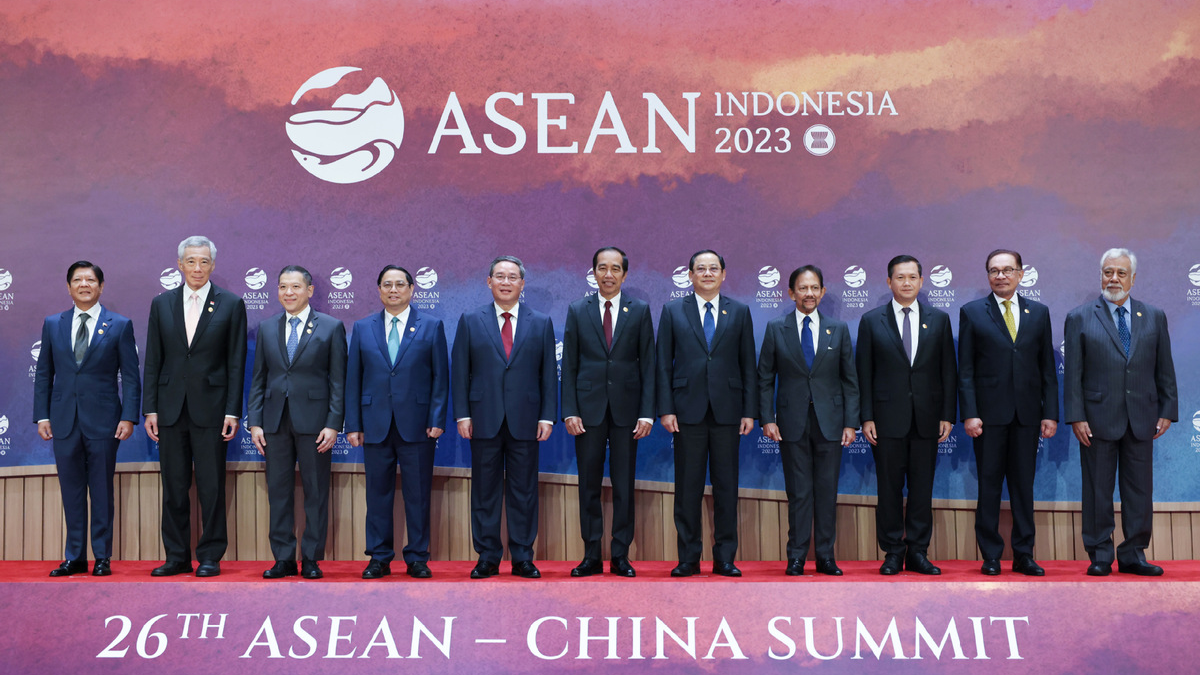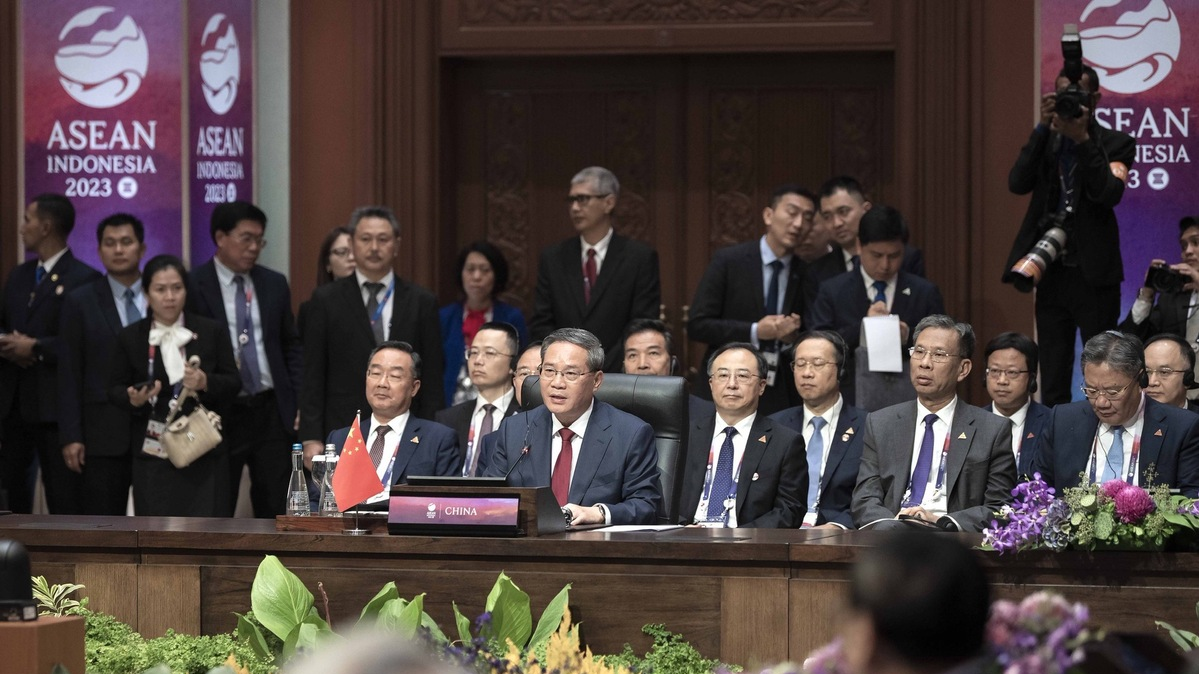
Chinese Premier Li Qiang poses for a group photo with participants attending the 26th China-ASEAN Summit in Jakarta, Indonesia, Sept 6, 2023. /Xinhua
Chinese Premier Li Qiang poses for a group photo with participants attending the 26th China-ASEAN Summit in Jakarta, Indonesia, Sept 6, 2023. /Xinhua
Editor's note: Bobby Naderi, a special commentator on current affairs for CGTN, is a London-based journalist, guest contributor in print, radio and television, and documentary filmmaker. The article reflects the author's opinions, and not necessarily the views of CGTN.
Leaders from all over the world convened in Jakarta, Indonesia, for an annual summit that could determine the direction of relations between nations in the Asia-Pacific region.
In light of escalating international tensions, Chinese Premier Li Qiang issued a stark warning at the 26th ASEAN Plus Three Summit: It is essential to oppose a new Cold War and make sure disputes are properly handled among countries. He couldn't be more on the mark. The warning comes as tensions in the South China Sea and more significant power rivalry, despite recent lame diplomatic efforts, show not the faintest sign of resolving themselves any time soon.
The call for caution from the Chinese premier should not be disregarded as escalation continues to be the rule of the game. The previous Cold War, which divided the world for more than four decades, is being felt today. That time period was characterized by antagonistic interactions, an arms race, and proxy wars that dangerously drew humanity to the verge of disaster.
There could be similar repercussions if a new Cold War coupled with a more aggressive military posture and zero-sum political struggle breaks out, this time in every corner of the Asia-Pacific region. It might surpass the most recent wars in size and destruction.
The lessons of history
It is important to consider the historical precedents established during the previous Cold War in order to comprehend the potential effects of a new Cold War.
In a bid to offset what they saw as Soviet influence, the U.S. and its allies supported different governments and uprisings in their fight against communism. This strategy led to several covert operations and military interventions with disastrous results.
One of the most devastating events may have been the U.S.'s engagement in the Vietnam War, which resulted in millions of deaths and had an ongoing effect on Asia-Pacific politics. Elsewhere, ideological conflicts turned several regions of the world into battlefields. Numerous lives were lost as a result of civil wars, military coups, and insurgencies, which also tore civilizations apart, destroying the capacity for a decent co-existence.
Even normalizing a new Cold War mentality is likely to lead to comparable military efforts and the formation of new blocs with dubious allies and stand-ins of every sort. The "us versus them" approach runs the risk of bolstering support for a new arms race and military escalation that may stoke war and endanger humanity.
Such measures could have disastrous effects on global stability as well as the impacted nations. It might take important funds away from tackling pressing global issues like pandemics, climate change, and economic injustice. It might even pass from a "contained" Cold War, under careful supervision, to the revival of nuclear fears.
Sensible diplomacy over escalation
A step in the right direction has been made by ASEAN and China in their discussions about a code of conduct for the South China Sea. This might offer a framework for resolving conflicts and guaranteeing the peaceful coexistence of countries in this strategic waterway. But progress in the conversations is imperative.
Li Qiang's exhortation to "make sure disputes are properly handled among countries" is a sincere call for negotiation, conversation, and amicable dispute resolution. There exists no other way to avoid military conflicts in a time when weapons' destructive capacity has increased enormously. Long periods of hostility between superpowers have not historically benefited anyone.

Chinese Premier Li Qiang attends the 26th China-ASEAN Summit in Jakarta, Indonesia, Sept 6, 2023. /Xinhua
Chinese Premier Li Qiang attends the 26th China-ASEAN Summit in Jakarta, Indonesia, Sept 6, 2023. /Xinhua
The South China Sea, a crucial commerce route where several ASEAN members have territorial claims that collide with each other, is the source of the majority of current tensions. It is essential that all parties prioritize diplomatic methods for conflict resolution and respect for international law.
This strategy is in line with ASEAN ideals, which have traditionally emphasized the need for avoiding involvement in conflicts between big countries. In settling maritime disputes, this approach emphasizes the significance of adhering to international standards and the United Nations Convention on the Law of the Sea (UNCLOS). Confrontation cannot win in this complex web of regional relations; rules-based order and sensible diplomacy must.
Framing the South China Sea disputes purely as a strategic rivalry between two strong nations oversimplifies a complex topic. The sovereignty and legal rights of the countries directly involved in these issues must be upheld without intervention by outside powers. Failure to do so would be a serious setback in a world where international cooperation is necessary to address issues like climate change, food security, pandemics, and economic injustice.
Be assured of one thing: The threat of a new Cold War hangs over the world, as China warned, raising worries about the potentially terrible consequences it might have. A path of destruction and human misery was left in the wake of the first Cold War, which was characterized by proxy wars in Asia, Latin America, and Africa. It is vital to consider if countries in the Asia-Pacific region are willing to suffer the risky path of militarization, arms races, and the possibility of a catastrophic confrontation as the world faces the potential of another Cold War.
It's never too late to opt for a path of collaboration and diplomacy rather than acting apocalyptically by taking lessons from the past and realizing the dangers of return to tensions of the Cold War era. The ramifications, particularly one involving the Asia-Pacific region, would be too severe to ignore, not to mention the risk of unexpected repercussions or accidental clashes.
Obviously, all too many of us don't grasp the stakes involved at this critical juncture in history. It is more important than ever for the ASEAN nations to follow Premier Li Qiang's warnings against a new Cold War and prioritize a reasonable stance in order to benefit from each other's strengths and contributions to regional stability and prosperity. International cooperation should be prioritized when addressing global concerns and regional conflicts should be settled amicably.
(If you want to contribute and have specific expertise, please contact us at opinions@cgtn.com. Follow @thouse_opinions on Twitter to discover the latest commentaries in the CGTN Opinion Section.)